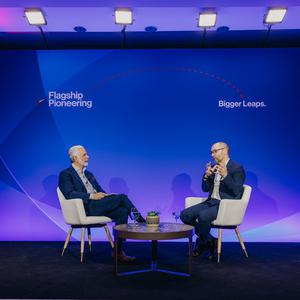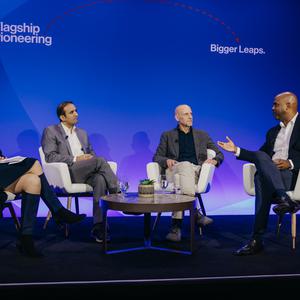Afeyan leaned into the need for imagination, saying that if you can’t imagine this future, then work will never begin on making it a reality.
Indeed, Afeyan argued that this transformation is not only possible but should be viewed as inevitable, since more than two billion people around the world are suffering from chronic diseases that cause 50% of all deaths worldwide. These diseases are able to take root and ravage the body because we lack sufficient early detection and intervention options. However, this need not be the case. Advances in science and technology have revealed periods of dynamic cellular dysfunction, called biodynamic shifts, that precede clinically detectable symptoms of disease, offering an opportunity to intervene and re-establish cellular homeostatis or inhibit further dysregulation.
Afeyan then offered a plan for action to ground this dream in reality. He called on public and private funders to invest more in understanding predisease, disease trajectories, and the cellular and molecular changes that lead to disease. He also noted the need for a new approach to regulation, as the traditional Food and Drug Administration (FDA) drug review process focuses on evidence of impact on patients that are already sick. The final key to facilitating this transformation is enabling broad coverage and access for preemptive health products, saying companies cannot rationally invest in preemptive interventions without a functioning marketplace supporting adoption of those interventions.
Following Afeyan’s remarks, Executive Director of the Center for Public Health at the Milken Institute Esther Krofah
moderated a panel of health-policy experts who hold or have held senior positions with the FDA, the Centers for Medicare and Medicaid Services (CMS), and in public health. These experts offered reflections on the policy and health system implications of this preemptive health vision.
One panelist and former FDA commissioner highlighted the need for more funding for early-stage research to identify and validate biomarkers, and to gain a better understanding of the “soil” in which the “seed” of disease grows. They also discussed the need to develop and utilize large-scale platforms and longitudinal datasets to confirm interim impacts of interventions, predict long-term benefits, and to track individuals over time. These platforms could take advantage of our growing access to real-world evidence and big data and help to inform updated regulatory frameworks focused on measuring “soil” conditions and the impact of interventions. They added that coverage and payment policies for the resulting technologies likely would need to go beyond the traditional fee-for-service model to keep pace with innovations in payment models more appropriate for preemptive technologies.
There was also broad consensus on the need to establish trust in this new system through education campaigns that would not only be necessary for the public but also for providers to help both groups understand how to use this new type of health information to make informed decisions. The experts noted the need for tailored messaging for the most vulnerable populations to ensure the equitable reach of these new interventions, and for more behavioral research as a key component of an effective strategy to ensure preemptive measures are appropriately and consistently utilized to maintain health.
Following the panelist’s reflections, the other roundtable participants provided additional input based on their areas of expertise and experience. One participant picked up on comments by Afeyan and highlighted the importance of building a paradigm that treats health security like national security. Others reinforced the need to bring diverse populations into the discussions and research around preemptive health from the very beginning and emphasized the historic challenge of persuading all individuals to engage in preemptive or preventative health strategies at a societal level. Acknowledging this challenge, one panelist responded by explaining that, as people learn more about their own particular health risks and predisease developments, compliance with preemptive approaches should increase accordingly.
As the roundtable drew to a close, Krofah recognized Lord Ara Darzi, Chairman of Flagship’s Preemptive Health and Medicine Initiative, to make concluding remarks. He explained that the advent of public health was an important transformation of our healthcare system in the 18th century, and that preemptive health and medicine could do the same in the 21st century — with greater precision. He thanked all of the participants for their thoughtful contributions to the discussion and emphasized that this is just the beginning of a journey that he hopes all those in attendance will join.






